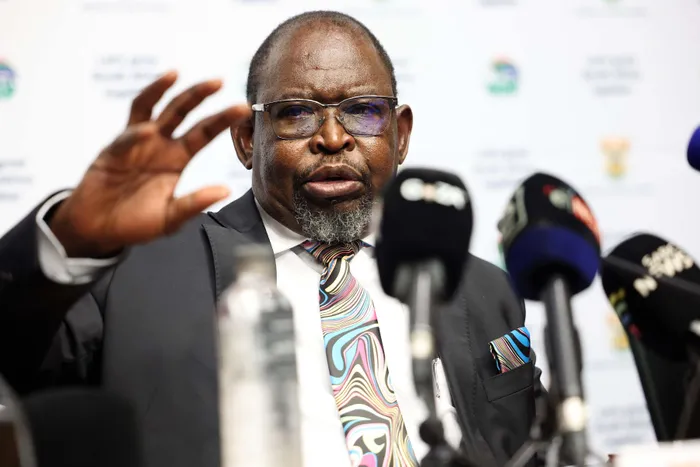Budget 3.0 torched as anti-poor, no confidence vote looms
Fiscal Policy

Finance Minister Enoch Godongwana’s 2025 National Budget, dubbed Budget 3.0, has drawn sharp criticism from opposition parties, trade unions, and civil society groups.
Image: GCIS
FINANCE Minister Enoch Godongwana’s 2025 National Budget, dubbed Budget 3.0, has drawn sharp criticism from opposition parties, trade unions, and civil society groups, who argue it fails to address South Africa’s pressing economic challenges, including unemployment, poverty, and inequality.
The budget, tabled on Wednesday, scrapped value-added tax (VAT) but introduced higher fuel levies, sparking widespread discontent.
The EFF outright rejected the budget, calling it “weak, misguided, and utterly disconnected from the lived reality of South Africans”. The party criticised deep expenditure cuts in essential sectors like education, health, and social development, arguing they weaken the state’s ability to deliver basic services.
“These cuts demonstrate a deliberate weakening of the state's ability to deliver basic services,” the EFF said.
The MK Party went further, filing a motion of censure against Godongwana and a vote of no confidence in President Cyril Ramaphosa.
MK Party spokesperson Nhlamulo Ndhlela condemned the budget as “another exercise in political theatre, a desperate attempt to repackage failure,” claiming it betrayed the working class. “This budget does not serve the poor and is a betrayal of the working class,” Ndhlela said.
Similarly, the ATM dismissed the budget as a “compromise” lacking meaningful strategies to uplift the over 30.3 million South Africans living in abject poverty.
“This budget fails to address the urgent needs of the majority of our citizens and does little to improve their material conditions… It is evident that this budget prioritises the interests of the GNU partners, aimed primarily at appeasing their political allies rather than advancing the welfare of the most vulnerable in our society,” the party said.
While Cosatu, an ally of the ANC-led Government of National Unity (GNU), welcomed some progressive allocations in the budget, it expressed concerns that it might not provide the necessary stimulatory effect for the economy.
The federation also criticised the lack of adjustment in personal income tax brackets for inflation, which could lead to workers paying higher taxes.
In contrast, Fedusa labelled the budget “contractionary, disproportionately regressive, and structurally unjust,” arguing that it reproduced the same fiscal posture that had failed to create jobs and drive inclusive growth.
The IFP offered a more measured assessment of the budget, acknowledging the continued investment in frontline social services and infrastructure development. However, the party also noted serious shortcomings, particularly regarding the impact on the cost of living for the poor and working class.
The IFP emphasised the need for a fiscally responsible, pro-poor, and jobs-focused approach to economic recovery.
Rise Mzansi leader Songezo Zibi criticised the budget’s priorities, stating: “Budgets were meant to solve problems. The debate around budgets is supposed to be about the order of those priorities, and whether these allocations are sufficient or to be spent in an efficient manner. We never got a chance to have that discussion.”
He highlighted South Africa’s unsustainable expenditure composition, including over R820 billion in salaries, over R440bn in social grants, and over R424bn in debt service costs at R1.2bn per day.
Frank Blackmore, lead economist at KPMG South Africa, described the budget as “underwhelming” but noted its completion as a positive step. “Leading up to this event, a lot of the questions were, what are we going to do with the 75bn deficits over the medium-term period with no VAT increase, in other words, the three years in which the budget is set up,” Blackmore said.
He pointed to key measures, including fuel levy hikes (15-16 cents per litre), increased borrowing (raising debt to 77.4% of GDP, up 1.2% from the previous budget), and reduced expenditure growth in critical sectors like health and education.
“Some frontline services like health and education, although their budgets grow, they grow by less than the previous budgetary amounts,” Blackmore said.
“The contents of the budget were slightly underwhelming. To balance the 75% deficit, it seemed as if the budget was put around those and not faced with dealing with the issues confronting South Africa at this point,” Blackmore said.
He warned that rising debt and public sector wage bills divert resources from frontline services and economic growth initiatives. “The negatives of this budget obviously are the increased debt and deficit, taking more resources away from frontline services and economic growth initiatives and the social wage,” he said.
While acknowledging some positives — such as public-private partnerships and structural reforms under Operation Vulindlela Phase 2 — Blackmore stressed that “far more needs to be done in this space in future in order to get our spending aimed at those core activities to get this economy growing at a more positive rate than is currently being achieved”.
With opposition parties vowing to block the budget’s passage and unions decrying its regressive measures, Budget 3.0 faces an uphill battle in Parliament. Critics argue it fails to tackle systemic inequality, while proponents highlight fiscal consolidation efforts. As debates intensify, the government’s ability to balance austerity with social imperatives remains under scrutiny.
Related Topics:
